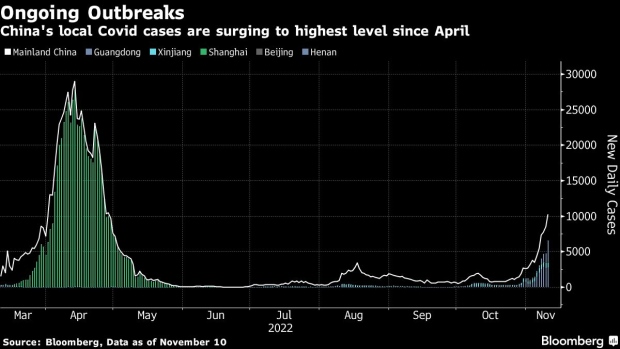Nov 11, 2022
China Eases Quarantine Rules, Flight Bans in Covid Zero Pivot
, Bloomberg News

(Bloomberg) -- China reduced the amount of time travelers and close contacts of virus cases must spend in quarantine, and pulled back on testing, in a significant calibration of the Covid Zero policy that has upended the world’s second-largest economy and raised public ire.
The changes, detailed in a 20-point playbook for officials, seem aimed at both reducing the country’s global isolation and easing the impact of virus mitigation measures on the ground.
One of the most notable shifts will see the time travelers into China are required to spend in quarantine cut to five days in a hotel or government facility, followed by three days confined to home, according to a National Health Commission statement Friday. The current rules require 10 days quarantine in total, with a week in a hotel then three days at home.
These Are the 20 New Rules China Is Following to Combat Covid
The same shortened quarantine length will now also be applied to close contacts of infected people in China, minimizing the disruptive contact-tracing regime that has seen millions thrown into government-run isolation facilities when officials race to stamp out outbreaks. Close contacts of close contacts will now no longer be identified.
In a further boon to international travel links, a controversial system that penalizes airlines for bringing virus cases into the country will also be scrapped, the statement said. The 20 measures are meant to guide local governments and authorities in Covid control going forward.
Bloomberg News reported in October and November that officials were discussing these changes.
Chinese Stocks Surge as Covid Zero Pivot Seen After Rules Eased
The suite of moves is the furthest-reaching overhaul of China’s virus approach since the pandemic began, and potentially marks the start of a shift that could see the country rejoin a world that’s now living with the virus.
A benchmark of Asian equities headed for the biggest advance in more than two years, while the Hang Seng China Enterprises Index jumped more than 8% as airlines and casinos climbed. The yuan strengthened and commodities from oil to iron ore and copper surged. Plane ticket bookings for flights into China doubled in the hour after the announcement.
The fact that the changes come at a time when Covid cases nationwide have surged to a six-month high -- with major outbreaks in Guangzhou and Beijing -- reflects an unmistakable change in President Xi Jinping’s zero-tolerance stance. On Thursday, the country’s top seven leaders, led by Xi, issued instructions for a more targeted, decisive approach to Covid, in noticeably milder rhetoric than before.
Still, considerable uncertainty remains over whether these are China’s first steps toward ultimately dropping all Covid controls, or merely the country’s new indefinite posture -- still the most onerous virus control regime in the world.
Bruce Pang, chief economist and head of research for Greater China at Jones Lang LaSalle Inc., said he found some market interpretations of the new announcement “too optimistic.”
“The Covid policy will only be fine-tuned in the short term, with the focus shifting between eliminating cases and making more precise measures,” he said.
The new measures are aimed at making China’s Covid approach “more science-based and precise,” Chinese Foreign Ministry spokesman Zhao Lijian told reporters Friday in Beijing. “It does not mean that we have relaxed Covid containment or take a laid-back approach.”
China’s adherence to Covid Zero, along with a property market slump, have hit economic activity this year, pushing down consumer and business confidence as people are stuck in a cycle of outbreaks, lockdowns and ubiquitous testing. Domestic demand has struggled with disruption from Covid controls, adding to the economy’s problems.
Walking Slowly
Among the new 20 guidelines were other measures to ease the burden of Covid Zero on ordinary Chinese people: only one pre-departure PCR test will be required now for travelers attempting to enter China, down from two. And when faced with outbreaks, local officials are being asked to avoid city-wide mass testing, unless transmission chains are unclear.
China’s Tolerance for Xi’s Unyielding Covid Fight Is Cracking
Nevertheless, China’s reopening process will likely remain slow and cautious, with millions of the country’s elderly still under-vaccinated, and a deeply-rooted public fear of Covid after years of propaganda demonizing Western countries’ lax attitudes toward the virus.
The leadership appears to be bracing for a surge of infections as winter sets in and easing takes hold. The new direction included measures to stockpile medicine and equipment needed to treat Covid, more resources for health care facilities including hospital beds, and a renewed push for vaccination, particularly among older people.
“For China, walking slowly is the most stable option. Walking too fast, the situation might be turned upside down, because the most mainstream problem is that the people there don’t have the right understanding of Covid,” said Jin Dong-Yan, a virologist at the University of Hong Kong.
“The policy changes are in a right direction. But if you want China to reach the endgame immediately, that’s not possible.”
--With assistance from Colum Murphy.
(Updates with Chinese foreign ministry spokesman’s comments in 13th paragraph.)
©2022 Bloomberg L.P.






